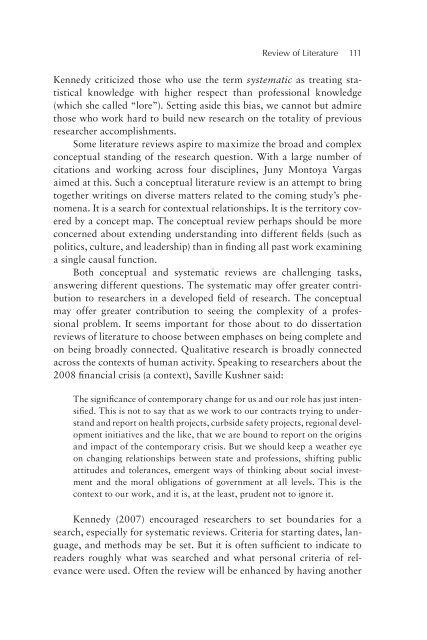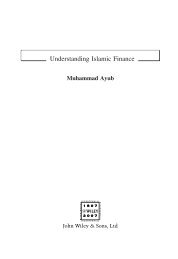How Things Work - Doha Academy of Tertiary Studies
How Things Work - Doha Academy of Tertiary Studies
How Things Work - Doha Academy of Tertiary Studies
Create successful ePaper yourself
Turn your PDF publications into a flip-book with our unique Google optimized e-Paper software.
Review <strong>of</strong> Literature 111<br />
Kennedy criticized those who use the term systematic as treating statistical<br />
knowledge with higher respect than pr<strong>of</strong>essional knowledge<br />
(which she called “lore”). Setting aside this bias, we cannot but admire<br />
those who work hard to build new research on the totality <strong>of</strong> previous<br />
researcher accomplishments.<br />
Some literature reviews aspire to maximize the broad and complex<br />
conceptual standing <strong>of</strong> the research question. With a large number <strong>of</strong><br />
citations and working across four disciplines, Juny Montoya Vargas<br />
aimed at this. Such a conceptual literature review is an attempt to bring<br />
together writings on diverse matters related to the coming study’s phenomena.<br />
It is a search for contextual relationships. It is the territory covered<br />
by a concept map. The conceptual review perhaps should be more<br />
concerned about extending understanding into different fields (such as<br />
politics, culture, and leadership) than in finding all past work examining<br />
a single causal function.<br />
Both conceptual and systematic reviews are challenging tasks,<br />
answering different questions. The systematic may <strong>of</strong>fer greater contribution<br />
to researchers in a developed field <strong>of</strong> research. The conceptual<br />
may <strong>of</strong>fer greater contribution to seeing the complexity <strong>of</strong> a pr<strong>of</strong>essional<br />
problem. It seems important for those about to do dissertation<br />
reviews <strong>of</strong> literature to choose between emphases on being complete and<br />
on being broadly connected. Qualitative research is broadly connected<br />
across the contexts <strong>of</strong> human activity. Speaking to researchers about the<br />
2008 financial crisis (a context), Saville Kushner said:<br />
The significance <strong>of</strong> contemporary change for us and our role has just intensified.<br />
This is not to say that as we work to our contracts trying to understand<br />
and report on health projects, curbside safety projects, regional development<br />
initiatives and the like, that we are bound to report on the origins<br />
and impact <strong>of</strong> the contemporary crisis. But we should keep a weather eye<br />
on changing relationships between state and pr<strong>of</strong>essions, shifting public<br />
attitudes and tolerances, emergent ways <strong>of</strong> thinking about social investment<br />
and the moral obligations <strong>of</strong> government at all levels. This is the<br />
context to our work, and it is, at the least, prudent not to ignore it.<br />
Kennedy (2007) encouraged researchers to set boundaries for a<br />
search, especially for systematic reviews. Criteria for starting dates, language,<br />
and methods may be set. But it is <strong>of</strong>ten sufficient to indicate to<br />
readers roughly what was searched and what personal criteria <strong>of</strong> relevance<br />
were used. Often the review will be enhanced by having another

















